Asia
Members of Congress meet with transgender activist in Japan
California Congressman Mark Takano among trip participants
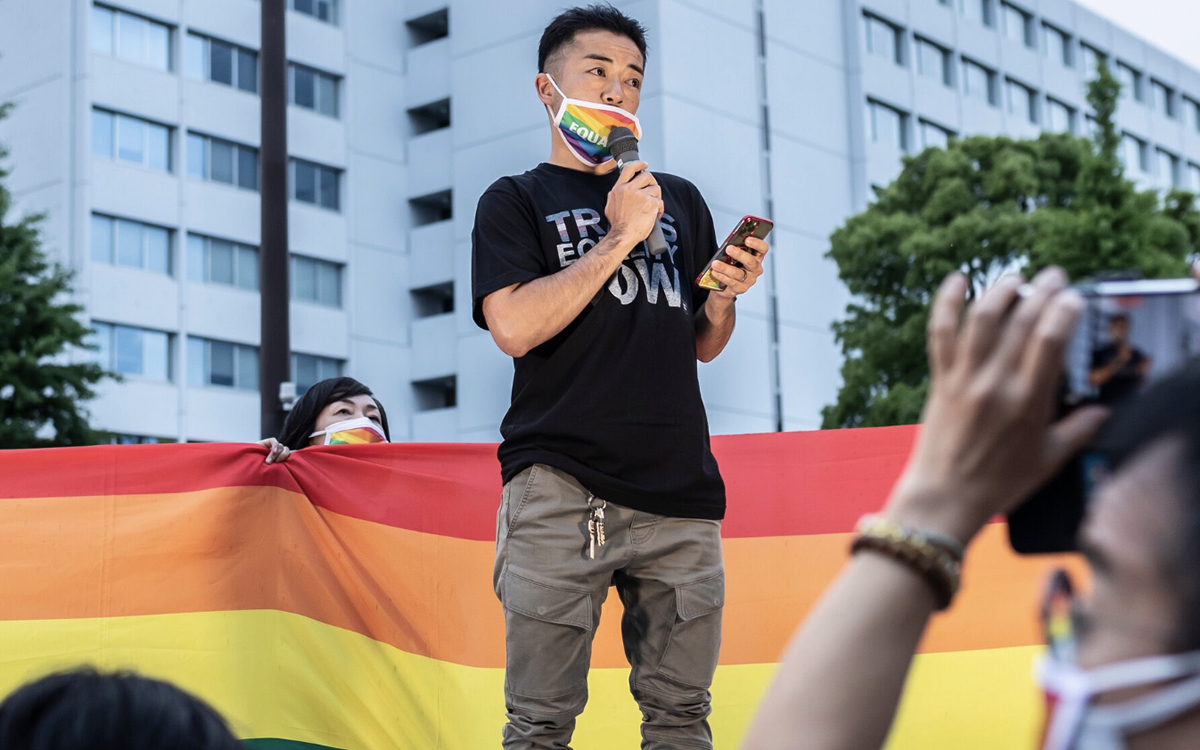
A group of U.S. lawmakers last month met with a prominent transgender activist in Japan while they were in the country.
U.S. Reps. Mark Takano (D-Calif.), Maxwell Alejandro Frost (D-Fla.), Alexandria Ocasio-Cortez (D-N.Y.), Frank Pallone (D-N.J.) and French Hill (R-Ark.) met with Fumino Sugiyama, a former member of Japan’s female fencing team who is now fighting for legal recognition of trans people in Japan. The D.C.-based Maureen and Mike Mansfield Foundation, which organized the congressional delegation that also included a trip to South Korea, arranged the meeting.
“Members of the delegation were very, very impressed with Fumino,” Takano told the Washington Blade last week during a telephone interview.
Frost, who is the first Gen Z’er elected to Congress, on Feb. 24 in a series of tweets praised Fumino and his advocacy efforts.
“One of my favorite meetings in Tokyo was meeting with trans organizer and activist, Fumino Sugiyama,” tweeted Frost. “Japan is still working through passing real anti-discrimination laws to protect LGBTQ+ folks and I felt incredibly inspired by Fumino and his fight.”
“He laid out the struggle and how the community is battling both legal and cultural roadblocks to even be recognized,” said Frost. “I spoke with him about the current fight in Florida and how Gov. DeSantis is targeting LGBTQ+ kids.”
Frost also said he is “working on setting up a virtual meeting between Fumino and a student activists in Florida.”
“I think his story can provide some inspiration for the struggle here,” he said.
He laid out the struggle & how the community is battling both legal & cultural roadblocks to even be recognized. I spoke with him about the current fight in Florida & how Gov. DeSantis is targeting LGBTQ+ kids. pic.twitter.com/vl2Oxb9vEm
— Maxwell Alejandro Frost (@MaxwellFrostFL) February 25, 2023
The trip began on Feb. 20 and ended on Feb. 26.
Takano arrived in Japan before the trip began.
The openly gay man of Japanese descent visited Pride House Tokyo, the country’s first permanent LGBTQ and intersex community center that opened ahead of the 2021 Summer Olympics that took place in Tokyo.
Takano participated in a “fireside chat” with LGBTQ and intersex Japanese people and expatriots, and met with a Goldman Sachs executive who he said is one of the few prominent people in the country who is out.
“Japan is still, pretty much I would say a ‘Don’t Ask, Don’t Tell’ society, but unlike the United States, Japan as a whole does not have violent homophobia where people are beat up or gay bashed or that kind of thing,” said Takano. “There is harassment and bullying in the schools. People face discomfort in the workplace and … until now it’s not like a coming out kind of society, but it’s not a place where (homosexuality is) criminalized and people suffer violence.”
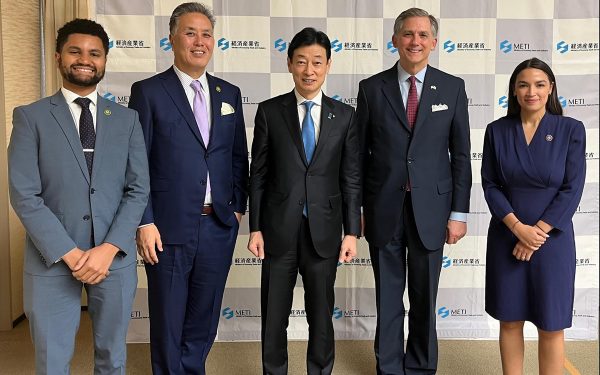
U.S. Ambassador to Japan Rahm Emanuel also invited Takano to attend a reception with members of the Japanese Diet (legislature)’s LGBT Caucus. (Takano noted to the Blade that none of them are openly LGBTQ or intersex.)
“I got a great sense of where things were, the state of play of this question of nondiscrimination language,” said Takano.
警察官、教師、議員などの公職者。LGBTQI+コミュニティーは多彩であり、みな家族です。そして頼れる存在です。日本は世界的にインクルージョンを擁護しています。連邦議会の議員平等幹部会で共同議長を務めるマーク・タカノ下院議員と共に、日本の国会が民意を反映し、差別に反対すると信じています。 https://t.co/tVDblU0OV1
— ラーム・エマニュエル駐日米国大使 (@USAmbJapan) February 17, 2023
The trip began less than a month after Prime Minister Fumio Kishida’s top aide, Masayoshi Arai, told reporters that he would “not want to live next door” to a same-sex couple and he does “not even want to look at them.” Arai also said marriage equality in Japan would “change the way society is” and “quite a few people would abandon this country.”
Kishida fired Arai.
The prime minister on Feb. 17 apologized for Arai’s comments during a meeting with Pride House Tokyo President Gon Matsunaka and other LGBTQ and intersex activists. Kishida on Feb. 28 nevertheless said he does not feel the lack of marriage rights for same-sex couples in Japan is discriminatory.
Members of the opposition Constitutional Democratic Party this week introduced a marriage equality bill in the Diet lower house.
Takano noted 20 members of the “hardline” Abe faction of Kishida’s ruling Liberal Democratic Party that former Prime Minister Shinzo Abe led before his 2022 assassination remain the main stumbling block to marriage equality and efforts to ban discrimination based on sexual orientation and gender identity. Takano stressed, however, the activists with whom he spoke in Japan welcome the increased attention around these issues.
“The fact that he’s having to comment on marriage equality is indicative of the Japanese media focusing attention on LGBT issues,” he said, referring to Kishida. “The sense among Japanese queer activists is that keeping the LGBT issue, or LGBT issues on the front page is very much something that works to their advantage.”
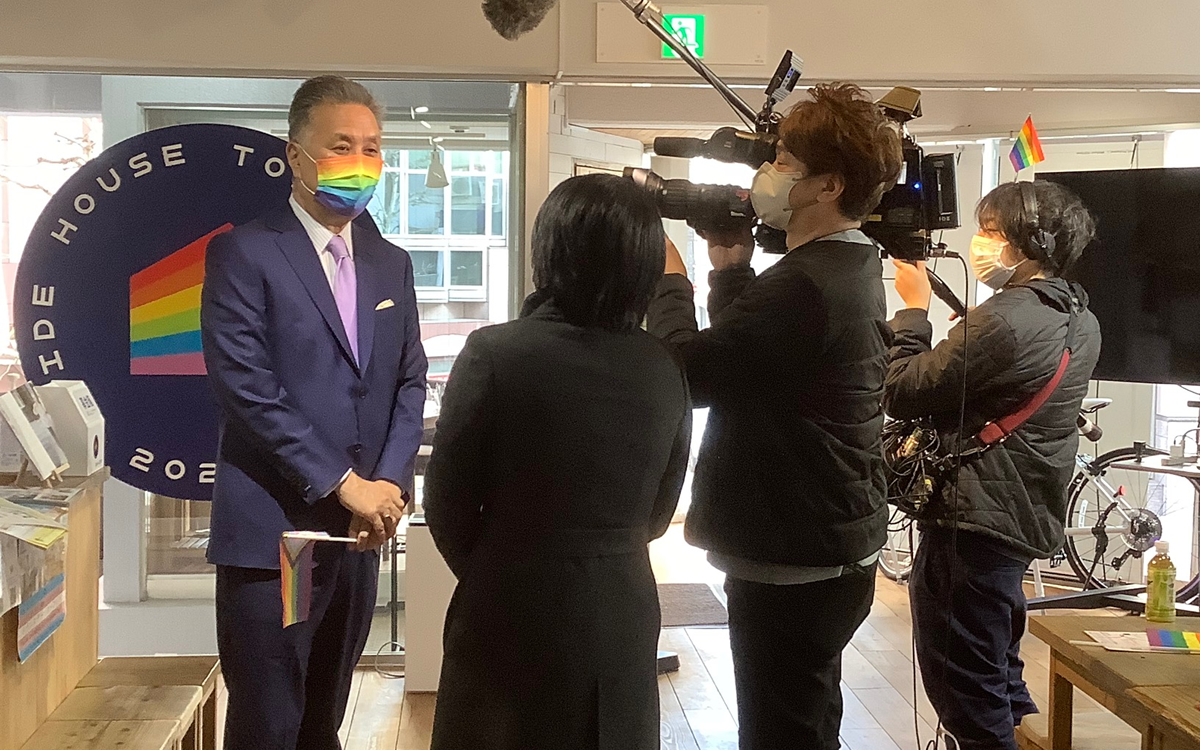
Takano further acknowledged Arai’s comments and reaction to them has sparked a renewed debate about LGBTQ and intersex rights in the country.
“He (Arai) really hasn’t suffered a huge consequence for those remarks,” said Takano, noting Arai remains in his post with the Japanese Ministry of Economy, Trade and Industry. “The question in Japan right now is will they just enact a law that is symbolic and checks the box, or will they advance substantive LGBT nondiscrimination protections.”
Takano referenced a Kyodo News poll that indicates 65 percent of people in Japan support legal protections for LGBTQ and intersex people. This figure increases to 80 percent among young people.
“It’s no wonder the activists are saying keep this in the news,” he said.
Takano was with then-House Speaker Nancy Pelosi (D-Calif.) when she led a congressional delegation to Japan, South Korea, Taiwan, Malaysia and Singapore last summer. Takano led a congressional delegation to Japan in November 2021.
“Japan plays such a key role in the Indo-Pacific as America’s most vital ally,” he said. “Japan moving forward in this area of LGBT rights and equality, I believe, will be highly consequential to progress in Asia as a whole.”
Asia
Maldives activists say new president won’t bring LGBTQ rights to country
Island nation is a popular tourist destination

Maldives, a Southeast Asian country that is a popular tourist destination, on Sept. 30 elected a new president.
Doctor Mohamed Muizzu, leader of the Progressive Party of Maldives and the president-elect, secured 54 percent of the total votes. He defeated incumbent President Ibrahim Mohamed Solih of the Maldivian Democratic Party.
Maldives does not offer any rights to the LGBTQ community.
Consensual same-sex sexual activities are prohibited in the country under the Penal Code 2014. Same-sex couples can face up to eight years in prison and 100 lashes (for both men and women.) The penal code works under the Islamic laws that criminalize same-sex relationships in the country.
Solih in 2019 started to work on human rights concerns and LGBTQ issues in the country, but the previous government abandoned the work after Islamic extremists pressured them. Solih did nothing to prevent extremist groups from attacking the country’s democratic institutions.
“I believe for ordinary liberals it would be safer with the new government because when the Progressive Party of Maldives ruled before, they did not get personal with activists who were not connected to the opposition. They were busy fighting with each other,” said Ulfa M. Fahmee, a humanist creator and LGBTQ rights activist. “Now the ruling party wants international rights groups to see they value democratic values, so they don’t openly arrest opposition activists, instead they attacked those viewed as promoting liberal values.”
“(The) new president is already focused on bringing economic equality unlike previous government who sent islanders to pray for rain when the poor ran out of stored rainwater in the islands making Maldivians believe they have to sacrifice LGBTQ and irreligious for God to get necessities instead of asking from government,” added Fahmee.
Fahmee was forced to flee Maldives because of safety concerns after state-sponsored news outlets accused her of blasphemy.
She said the Maldivian Democratic Party ran a hate campaign against her while the opposition party was protesting against government officials who were caught doing a blasphemous report.
Fahmee told the Washington Blade that Maldivian media is not allowed to post pictures until a conviction is secured, but the press published her pictures while she was still under investigation, putting her in danger of being harmed by extremists. With pain and anger in her words, Fahmee told the Blade that local police still have not returned any of her and her family’s confiscated electronics.
Fahmee is currently living in exile.
“We don’t have an openly LGBTQ community in Maldives, but the current govt enjoyed inciting hate and violence against ordinary liberals who were seen as part of LGBTQ,” said Fahmee. “Whenever privileged elites were accused of any un-Islamic activity, (the) MDP government did hate campaigns against ordinary liberals and jailed many people while at the same time sending human rights fraud reports to international rights organizations blaming Islamists for the hate spreading. Islamists are usually after the government officials so govt tries to divert hate targeted at them by encouraging more state sponsored hate against liberals.”
LGBTQ activists have faced several challenges in the Maldives, including disappearances and death.
Radical Islamic extremists in June 2012 killed blogger, LGBTQ activist and journalist Ismail Khilath Rasheed. Authorities did not investigate the murder.
According to a report published by The Edition, a local Maldivian media outlet, former President Mohamed Nasheed and his newly formed party will be part of the incoming government and will take oath on Nov. 17 with Muizzu.
“There is going to be no change as a consequence of Dr. Mohamed Muizzu being president,” said Shakyl Ahmed, an LGBTQ activist. “Some say that it will get worse because ‘salaf’ (a group of sheikhs) is on the new president’s side, but the new president definitely won’t make things better for us.”
Ahmed told the Blade he is not hopeful about the new government. He said that the new president doesn’t change the lives of the LGBTQ community in the country.
“Most LGBT people in Maldives are Muslim, so most of them don’t support gay rights in Maldives, even if they are gay,” said Ahmed. “However, they do engage in sexual acts with the same sex in secret. There are a few of us who support gay rights and we are trying to progressively change people’s minds.”
Kit Died, another LGBTQ activist, told the Blade the president-elect will make the situation worse for the LGBTQ community in Maldives. Died added he is known to have connections with extremist factions.
“We have no support from the government at all — our existence itself is a crime — so all crimes against queer folk in this country get ignored,” said Kit. “Queer people get blackmailed, robbed, and sexually assaulted regularly here with no investigation or police report.”
“The Anti-LGBTQIA+ narrative in Maldives is upheld by the constitution,” added Kit. “The Maldives constitution is one of the few places in the world that mandates all its citizens to be Sunni Muslims. This creates a paradox for citizens who were born into the religion and want to leave or happen to be queer. There’s no space for queerness in the Maldives’ specific variety of Islam, which is stricter than most in practice thanks to the tiny population that is concentrated in very small cities.”
Ankush Kumar is a reporter who has covered many stories for Washington and Los Angeles Blades from Iran, India and Singapore. He recently reported for the Daily Beast. He can be reached at [email protected]. He is on Twitter at @mohitkopinion.
Asia
Pakistan resumes issuing ID cards to transgender people
Federal Shariat Court in June ruled against trans rights law
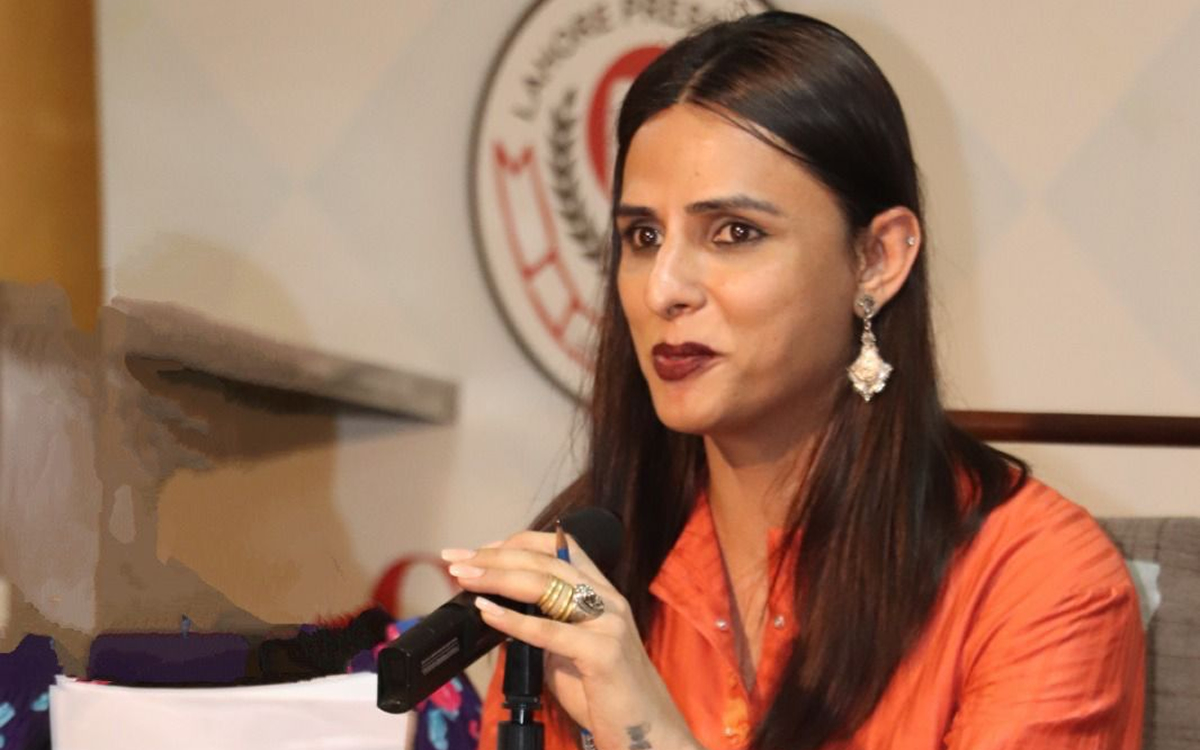
Pakistani authorities have resumed the registration of transgender people and issuing identity cards to them after the Supreme Court’s Sharia Appellate Bench on Sept. 25 ruled on the issue.
An Islamic court on June 13 ordered all data acquisition units to halt the registration of trans people and to issue identity cards only to males or females.
The Supreme Court in 2009 extended civil rights to the trans community. Pakistani MPs in 2018 passed a historic law, the Transgender Persons (Protection of Rights) Act, that guaranteed all the rights available for all citizens to trans people, and prohibited any discrimination based on gender identity.
Jamiat-e-Islami, Jamiat Ulema-e-Islam and Tehreek Labbaik Pakistan and several other Pakistani religious political parties in 2022 raised objections to the law, stating it was un-Islamic.
The Federal Shariat Court in May struck down three sections of the Transgender Persons (Protection of Rights) Act and said Islamic teachings do not allow anyone to change their gender at their will. The court also said gender assigned at birth shall remain intact.
The Islamic court’s June 13 verdict prohibited any new registration for an identity card with an X gender marker or update an older one. The National Database and Registration Authority after the ruling issued that halted the registration of trans people. Individuals in Pakistan need ID cards to open bank accounts, seek legal aid, report a crime to the police, ask for medical help and receive a passport.
NADRA is an independent agency that regulates the government database and registration of sensitive information of citizens. The Federal Shariat Court is a constitutional Islamic court that scrutinizes and determines if laws made in Parliament comply with Sharia laws.
Nayyab Ali, a trans rights activist in Pakistan, during a telephone interview with the Washington Blade said the court’s voting bloc is based on religious elements. She also said right-wing political parties target trans Pakistanis when they do not get publicity.
“Right-wing political parties picked up the transgender issues in Parliament, and started hate speeches on transgender laws,” said Ali. “There is also a divide in the transgender community in Pakistan. Some transgender factions also support right-wing political parties to strengthen their agenda. People inside the government came from the grassroots level of society. Society has an extreme level of phobia and stigma for the transgender population, so when they come to power, they make policies that are against the transgender community.”
Ali told the Blade that former Prime Minister Imran Khan introduced an “Islamic utopia” in Pakistan and implemented an Islamization policy in his day-to-day politics, which created more hatred against trans community and affected society at large.
Ali on X, formerly known as Twitter, praised the decision that allowed the resumption of issuing ID cards to trans people. Documents the Blade obtained indicate she is one of those who challenged the Federal Shariat Court’s decision.
Kami Sid, a trans activist and executive director of Sub Rang Society, a Pakistan-based LGBTQ rights organization, said the community is happy and quite hopeful for a better future.
“First we as a community were very much worried about the Federal Shariat Court’s decision,” said Sid. “But after several advocacy and meetings we are quite hopeful for the fight against the Federal Shariat Court decision, and now quite relaxed as a transgender activist, I must say the community is happy.”
Kami, like Ali, also challenged the Federal Shariat Court’s decision.
Kami told the Blade conservative parties over the last few years have become more willing to promote an agenda that opposes rights for women, children and trans people.
“Transgender rights are human rights,” said Kami. “That is why the previous government refrained from commenting on the Shariah Court ruling out of fear of the right-wing parties and because transgender people are not a top priority.”
Foreign Minister Jalil Abbas Jilani attended the annual UPR meeting in Geneva in January and received approximately 354 human rights-specific recommendations.
Iside Over, an online news website, reports Pakistan may not get an extension over the European Union’s Preferential Trade Arrangement over its failure to improve its human rights record, among other reasons. Kami told the Blade the Generalized System of Preference, or GSP, from the EU has put pressure on the Pakistani government to address human rights-specific issues.
Ankush Kumar is a reporter who has covered many stories for Washington and Los Angeles Blades from Iran, India and Singapore. He recently reported for the Daily Beast. He can be reached at [email protected]. He is on Twitter at @mohitkopinion.
Asia
UN human rights experts condemn Taliban over treatment of LGBTQ Afghans
Extremist group regained control of country on Aug. 15, 2021
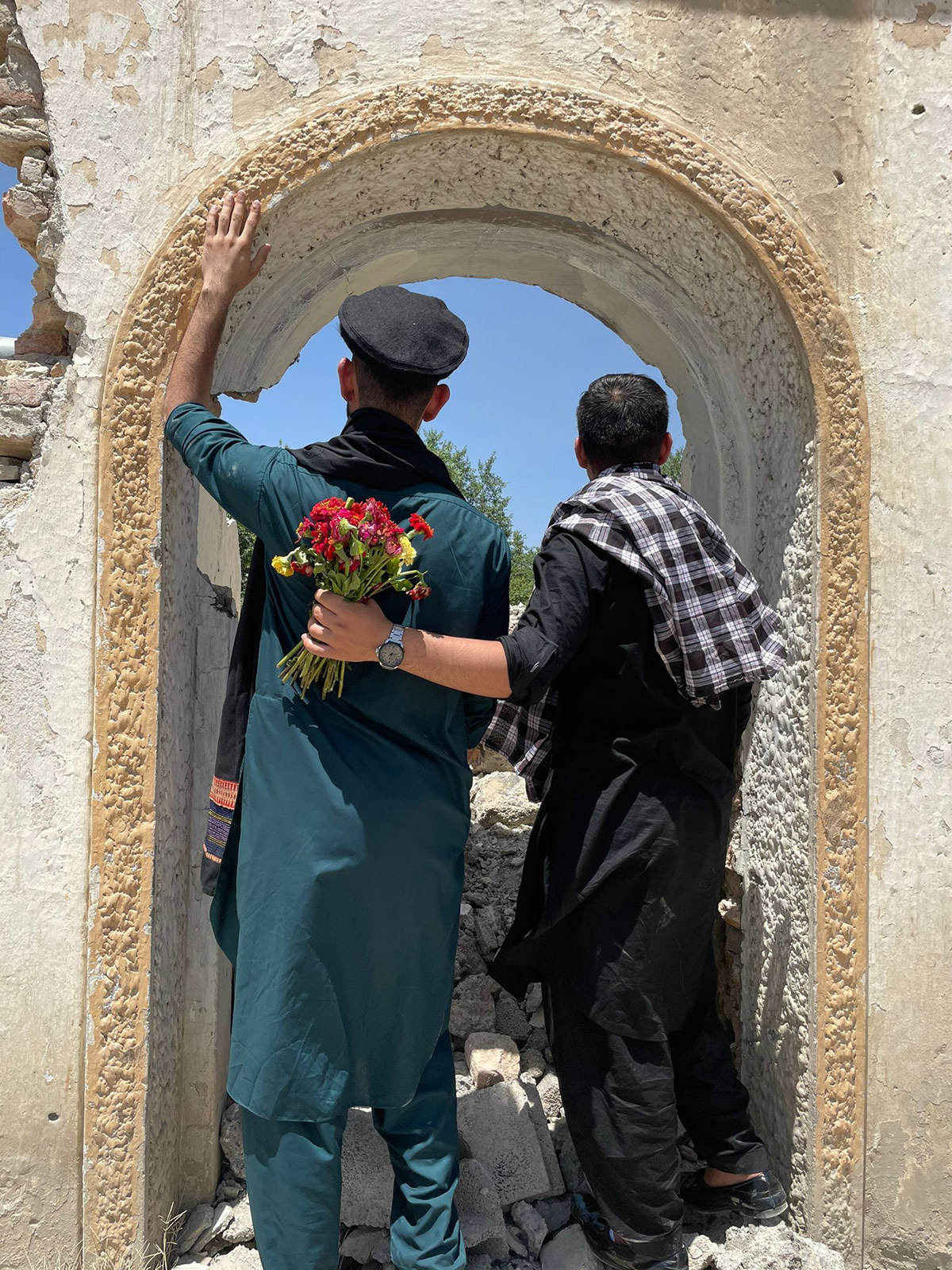
United Nations human rights experts on Monday sharply criticized the Taliban over its treatment of LGBTQ and intersex people and other groups in Afghanistan.
“Two years ago, the Taliban seized power in Afghanistan. Since then, the policies they have imposed on the Afghan population have resulted in a continuous, systematic and shocking rescinding of a multitude of human rights, including the rights to education, work and freedoms of expression, assembly and association. Consistent credible reports of summary executions and acts tantamount to enforced disappearances, widespread arbitrary detention, torture, and ill treatment, as well as arbitrary displacement have caused increased concern,” reads a statement that Victor Madrigal-Borloz, the independent U.N. expert on LGBTQ and intersex issues, and others signed. “The hardest hit are women and girls, ethnic, religious and other minorities, people with disabilities, displaced persons, LGBTQ+ persons, human rights defenders and other civil society actors, journalists, artists, educators and former government and security officials.”
“Despite reassurances by the Taliban de facto authorities that any restrictions, particularly in terms of access to education would be temporary, the facts on the ground have demonstrated an accelerated, systematic and all engulfing system of segregation, marginalization and persecution,” the statement further notes.
The Taliban regained control of Afghanistan on Aug. 15, 2021. The last American forces withdrew from the country 15 days later.
The State Department in its 2022 human rights report notes the Taliban “criminalizes consensual same-sex sexual activity, and representatives routinely enforced this position through violence, intimidation, harassment and targeted killings.”
“Under sharia, conviction of same-sex sexual conduct is punishable by death, flogging or imprisonment,” reads the report. “Individual Taliban members made public statements reiterating that their interpretation of sharia includes the death penalty for homosexuality.”
The report further notes the Taliban “takeover of the country increased fears of repression and violence among LGBTQI+ persons, with many individuals going into hiding to avoid being captured by the Taliban. Many fled the country after August 2021. LGBTQI+ persons faced increased threats, attacks, sexual assaults, and discrimination from Taliban members, strangers, neighbors and family members.”
Outright International and Human Rights Watch in January 2022 released a report that includes interviews with LGBTQ and intersex Afghans who the Taliban have targeted. They include a 20 year-old man who said Taliban members “loaded him into a car” at a checkpoint and “took him to another location where four men whipped and then gang raped him over the course of eight hours.” The report also notes the Taliban beat a transgender woman in Kabul, the Afghan capital, and “shaved her eyebrows with a razor” before they “dumped her on the street in men’s clothes and without a cellphone.”
-

 Africa5 days ago
Africa5 days agoCongolese lawmaker introduces anti-homosexuality bill
-

 District of Columbia2 days ago
District of Columbia2 days agoReenactment of first gay rights picket at White House draws interest of tourists
-

 District of Columbia1 day ago
District of Columbia1 day agoNew D.C. LGBTQ+ bar Crush set to open April 19
-

 World5 days ago
World5 days agoOut in the World: LGBTQ news from Europe and Asia










